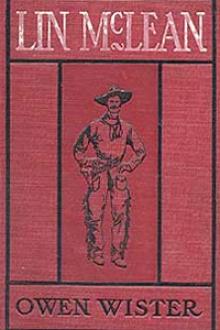The Girl from Sunset Ranch, AMY BELL MARLOWE [mini ebook reader txt] 📗

- Author: AMY BELL MARLOWE
Book online «The Girl from Sunset Ranch, AMY BELL MARLOWE [mini ebook reader txt] 📗». Author AMY BELL MARLOWE
When she had gone to school in Denver, her father had sent a sum of money to the principal and that lady had seen that Helen was dressed tastefully and well. But all these garments she had outgrown.
To tell the truth, Helen had spent little of her time in studying the pictures in fashion magazines. In fact, there were no such books about Sunset Ranch.
The girl realized that the rough and ready frocks she possessed were not in style. There was but one store in Elberon, the nearest town, where ready-to-wear garments were sold. She went there and purchased the best they had; but they left much to be desired.
She got a brown dress to travel in, and a shirtwaist or two; but beyond that she dared not go. Helen was wise enough to realize that, after she arrived at her Uncle Starkweather's, it would be time enough to purchase proper raiment.
She "dressed up" in the new frock for the boys to admire, the evening before she left. Every man who could be spared from the range--even as far as Creeping Ford--came in to the "party." They all admired Helen and were sorry to see her go away. Yet they gave her their best wishes.
Big Hen Billings rode part of the way to Elberon with her in the morning. She was going to send the strawberry roan back hitched behind the supply wagon. Her riding dress she would change in the station agent's parlor for the new dress which was in the tray of her small trunk.
"Keep yer eyes peeled, Snuggy," advised the old foreman, with gravity, "when ye come up against that New York town. 'Tain't like Elberon--no, sir! 'Tain't even like Helena.
"Them folks in New York is rubbing up against each other so close, that it makes 'em moughty sharp--yessir! Jumping Jehosaphat! I knowed a feller that went there onct and he lost ten dollars and his watch before he'd been off the train an hour. They can do ye that quick!"
"I believe that fellow must have been you, Hen," declared Helen, laughing.
The foreman looked shamefaced. "Wal, it were," he admitted. "But they never got nothin' more out o' me. It was the hottest kind o' summer weather--an' lemme tell yuh, it can be some hot in that man's town.
"Wal, I had a sheepskin coat with me. I put it on, and I buttoned it from my throat-latch down to my boot-tops. They'd had to pry a dollar out o' my pocket with a crowbar, and I wouldn't have had a drink with the mayor of the city if he'd invited me. No, sirree, sir!"
Helen laughed again. "Don't you fear for me, Hen. I shall be in the best of hands, and shall have plenty of friends around me. I'll never feel lonely in New York, I am sure."
"I hope not. But, Snuggy, you know what to do if anything goes wrong. Just telegraph me. If you want me to come on, say the word----"
"Why, Hen! How ridiculous you talk," she cried. "I'll be with relatives."
"Ya-as. I know," said the giant, shaking his head. "But relatives ain't like them that's knowed and loved yuh all yuh life. Don't forgit us out yere, Snuggy--and if ye want anything----" His heart was evidently too full for further utterance. He jerked his pony's head around, waved his hand to the girl who likewise was all but in tears, and dashed back over the trail toward Sunset Ranch.
Helen pulled the Rose pony's head around and jogged on, headed east.
CHAPTER V (AT BOTH ENDS OF THE ROUTE)
As Helen walked up and down the platform at Elberon, waiting for the east-bound Transcontinental, she looked to be a very plain country girl with nothing in her dress to denote that she was one of the wealthiest young women in the State of Montana.
Sunset Ranch was one of the few remaining great cattle ranches of the West. Her father could justly have been called "a cattle king," only Prince Morrell was not the sort of man who likes to see his name in print.
Indeed, there was a good reason why Helen's father had not wished to advertise himself. That old misfortune, which had borne so heavily upon his mind and heart when he came to die, had made him shrink from publicity.
However, business at Sunset Ranch had prospered both before and since Mr. Morrell's death. The money had rolled in and the bank accounts which had been put under the administration of Big Hen Billings and the lawyer at Elberon, increased steadily.
Big Hen was a generous-handed administrator and guardian. Of course, the foreman of the ranch was, perhaps, not the best person to be guardian of a sixteen-year-old girl. He did not treat her, in regard to money matters, as the ordinary guardian would have treated a ward.
Big Hen didn't know how to limit a girl's expenditures; but he knew how to treat a man right. And he treated Helen Morrell just as though she were a sane and responsible man.
"There's a thousand dollars in cash for you, Snuggy," he had said. "I got it in soft money, for it's a fac' that they use that stuff a good deal in the East. Besides, the hard money would have made a good deal of a load for you to tote in them leetle war-bags of yourn."
"But shall I ever need a thousand dollars?" asked Helen, doubtfully.
"Don't know. Can't tell. Sometimes ye need money when ye least expect it. Ye needn't tell anybody how much you've got. Only, it's there--and a full pocket is a mighty nice backin' for anybody to have.
"And if ye find any time ye want more, jest telegraph. We'll send ye what they call a draft for all ye want. Cut a dash. Show 'em that the girl from Sunset Ranch is the real thing, Snuggy."
But she had only laughed at this. It never entered Helen Morrell's mind that she should ever wish to "cut a dash" before her relatives in New York.
She had filed a telegram to Mr. Willets Starkweather, on Madison Avenue, before the train arrived, saying that she was coming. She hoped that her relatives would reply and she would get the reply en route.
When her father died, she had written to the Starkweathers. She had received a brief, but kindly worded note from Uncle Starkweather. And it had scarcely been time yet, so Helen thought, for Aunt Eunice or the girls to write.
But could Helen have arrived at the Madison Avenue mansion of Willets Starkweather at the same hour her message arrived and heard the family's comments on it, it is very doubtful if she would have swung herself aboard the parlor car of the Transcontinental, without the porter's help, and sought her seat.
The Starkweathers lived in very good style, indeed. The mansion was one of several remaining in that section, all occupied by the very oldest and most elevated socially of New York's solid families. They were not people whose names appeared in the gossip columns of the papers to any extent; but to live in their neighborhood, and to meet them socially, was sufficient to insure one's welcome anywhere.
The Starkweather mansion had descended to Willets Starkweather with the money--all from his great-uncle--which had finally put the family upon its feet. When Prince Morrell had left New York under a cloud, his brother-in-law was a struggling merchant himself.
Now, in sixteen years, he had practically retired. At least, he was no longer "in trade." He merely went to an office, or to his broker's, each day, and watched his investments and his real estate holdings.
A pompous, well-fed man was Willets Starkweather--and always imposingly dressed. He was very bald, wore a closely cropped gray beard, eyeglasses, and "Ahem!" was an introduction to almost everything he said. That clearing of the bronchial tubes was an announcement to the listening world that he, Willets Starkweather, of Madison Avenue, was about to make a remark. And no matter how trivial that remark might be, coming from the lips of the great man, it should be pondered upon and regarded with awe.
Mr. Starkweather was a widower. Helen's Aunt Eunice had been dead three years. It had never been considered necessary by either Mr. Starkweather, or his daughters, to write "Aunt Mary's folks in Montana" of Mrs. Starkweather's death.
Correspondence between the families had ceased at the time of Mrs. Morrell's death. The Starkweather girls understood that Aunt Mary's husband had "done something" before he left New York for the wild and woolly West. The family did not--Ahem!--speak of him.
The three girls were respectively eighteen, sixteen, and fourteen. Even Flossie considered herself entirely grown up. She attended a private school not far from Central Park, and went each day dressed as elaborately as a matron of thirty.
For Hortense, who was just Helen Morrell's age, "school had become a bore." She had a smattering of French, knew how to drum nicely on the piano--she was still taking lessons in that polite accomplishment--had only a vague idea of the ordinary rules of English grammar, and couldn't write a decent letter, or spell words of more than two syllables, to save her life.
Belle golfed. She did little else just now, for she was a creature of fads. Occasionally she got a new one, and with kindred spirits played that particular fad to death.
She might have found a much worse hobby to ride. Getting up early and starting for the Long Island links, or for Westchester, before her sisters had had their breakfast, was not doing Belle a bit of harm. Only, she was getting in with a somewhat "sporty" class of girls and women older than herself, and the bloom of youth had been quite rubbed off.
Indeed, these three girls were about as fresh as is a dried prune. They had jumped from childhood into full-blown womanhood (or thought they had), thereby missing the very best and sweetest part of their girls' life.
They had come in from their various activities of the day when Helen's telegram arrived. Naturally they ran with it to their father's "den"--a gorgeously upholstered yet small library on the ground floor, at the back.
"What is it now, girls?" demanded Mr. Starkweather, looking up in some dismay at this general onslaught. "I don't want you to suggest any further expenditures this month. I have paid all the bills I possibly can pay. We must retrench--we must retrench."
"Oh, Pa!" said Flossie, saucily, "you're always saying that. I believe you say 'We must retrench!' in your sleep."
"And small wonder if I do," he grumbled. "I have lost some money; the stock market is very dull. And nobody is buying real estate. I--I am quite at my wits' ends, I assure you, girls."
"Dear me! and another mouth to feed!" laughed Hortense, tossing her head. "That will be excuse enough for telling her to go to a hotel when she arrives."
"Probably the poor thing won't have the price of a room," observed Belle, looking again at the telegram.
"What is that in your hand, child?" demanded Mr. Starkweather, suddenly seeing the yellow slip of paper.
"A dispatch, Pa," said Flossie, snatching it out of Belle's hand.
"A telegram?"
"And you'd





Comments (0)